Psoriasis is the name of a disease that has no cure and that can affect anyone. In general, psoriasis affects people who are under 30 years old or over 50 years old. The spots mentioned above can appear on the scalp, elbows and knees, with 15% of cases manifesting in childhood.
Psoriasis is not a contagious disease, but it is still stigmatized by society. Because it is characterized by spots on the skin that can flake off, the appearance that deviates from the standard of beauty is ridiculed.
Misinformation about psoriasis is one of the evils that people who suffer from the disease have to face. To combat prejudice against this part of society and to understand how this disease works, understand more about psoriasis.
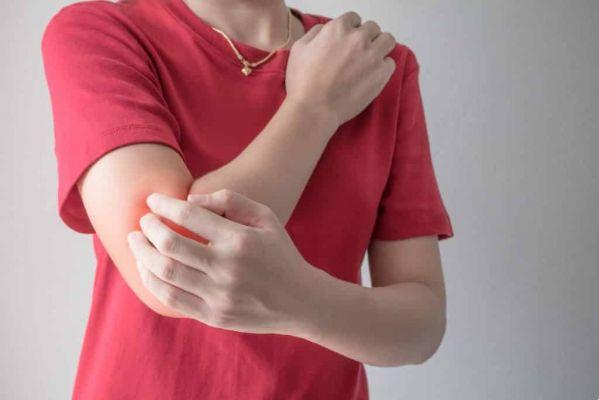
Causes of psoriasis
The main causes of psoriasis are exposure to cold and low incidence of sunlight on the skin, episodes of stress, ingestion of alcoholic beverages, use of medications (some anti-inflammatory and others psychiatric, such as lithium) and genetics (30% of cases). ).
Although these are the most common causes, exposing yourself to the sun and heat, stopping drinking alcohol and certain medications, for example, may not be effective in preventing the disease. In fact, there is no precise way to prevent psoriasis.
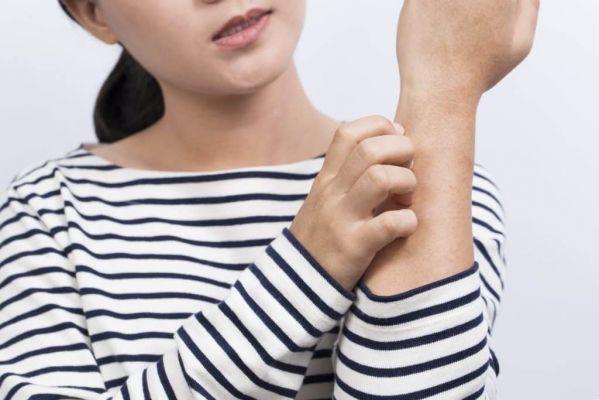
Symptoms of Psoriasis
The symptoms of psoriasis are the lesions that appear on the skin. They can appear in different places on the body, presenting different characteristics. Watch:
1) Psoriasis vulgaris
It is characterized by skin lesions with different sizes, delimitations and reddish coloration. They also have scales, which can be dry, sticky, silvery, or grayish. The main sites of incidence are the scalp, knees and elbows.
2) Inverted psoriasis
The type of inverted psoriasis lesion differs from the others because it is a wet lesion, which is located in areas such as folds on the scalp, knees and elbows. In this case, there is no peeling of the skin.
3) Guttate psoriasis
The lesions resemble small drops, which can appear on the trunk, arms and thighs, near regions such as the shoulders and hips. This type of psoriasis is associated with infectious processes in the body, and it affects children and young adults more often.
4) Erythrodermic psoriasis
In this type of psoriasis, the lesions occupy 75% or more of the entire area of the body. They can cause discomfort for those who have them, as they suffer prejudice from society. Still, it is possible to treat it.
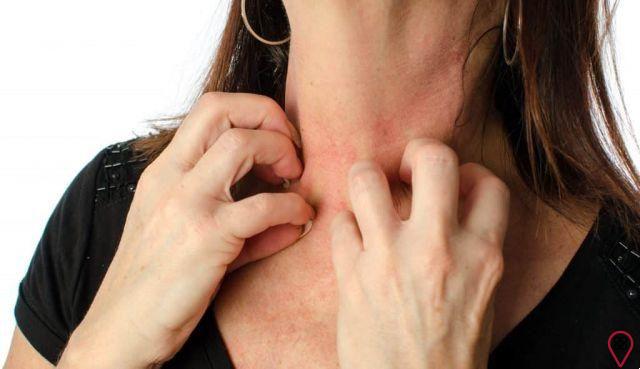
5) Nail psoriasis
Unlike other types of psoriasis, nail psoriasis happens on the fingernails. Point-shaped depressions or yellowish spots can affect this region of the body, in this case.
6) Arthropathic psoriasis
A rarer form of psoriasis is arthropathic psoriasis, which affects 8% of people who suffer from the condition. It is characterized by joint involvement, causing pain in the tips of the fingers and toes or in larger joints, such as the knees and elbows.
7) Postulant psoriasis
The main difference between postulous psoriasis and other forms of the disease is that, in this case, there is pus in the lesions. They can hit the feet and hands or they can spread throughout the body.
8) Palmoplantar psoriasis
In this case, the lesions resemble fissures, which develop on the palms of the hands and soles of the feet.
If you identify some of these lesions on your body, it is best to consult a dermatologist or a person who specializes in psoriasis. Although the disease has no cure, as it is widely studied, it is possible to treat it with medical supervision.
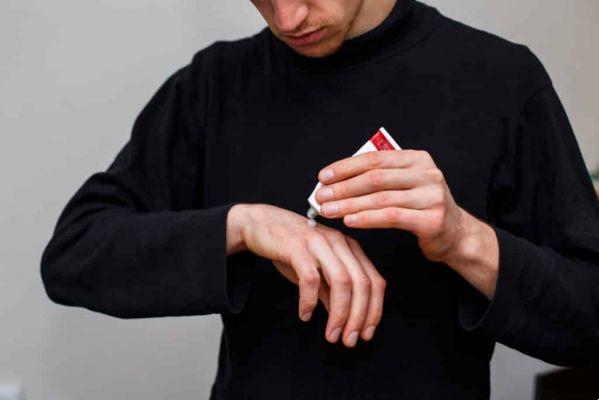
Psoriasis treatment
Mild and moderate cases of psoriasis are the majority, corresponding to 80% of them. This means that effective treatment can be adopted to treat the lesions and prevent them from returning for most people.
Among the ways to restore the skin and prevent new lesions from appearing are: use of local medications, skin hydration and routine exposure to the sun. There are cases of people who can't expose themselves to the sun often. It is possible to take baths in ultraviolet light A and B, with medical advice, unless the patient is a child.
There are some eating habits that can help with the disappearance of lesions, such as eating cold water fish or foods rich in omega 3, such as almonds.
Locally applied medications are the most suitable for mild and moderate cases. Tar-based ointments are effective, but they stain clothes and have a strong smell. Therefore, it is necessary to consult a professional who indicates a less aggressive alternative.
The most serious cases, which include injury to the entire body or that progress to joint problems, can be treated with oral medication, always with a doctor's recommendation. Some injuries may be harder to go away, but don't feel bad about it.
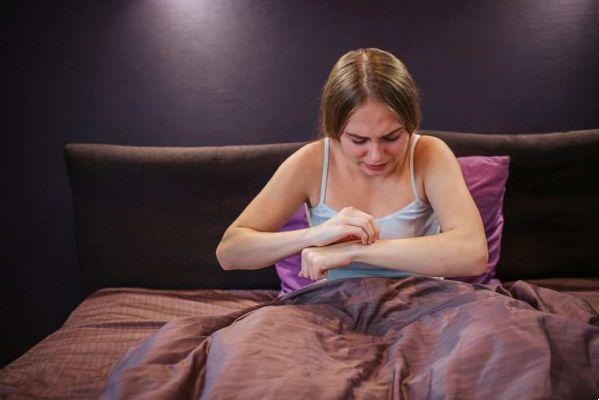
Psoriasis in body language
As previously mentioned, psoriasis is a skin disease that is caused by stress. If a person goes through stressful situations on a daily basis, it is possible that he will develop this problem. But this is not the only psychological factor that influences the appearance of psoriasis.
According to the language of the body, our bodies can reflect feelings, traumas and emotions in the form of physical or mental illness. The skin, being the largest organ of the human body, is also a target of everything we feel and experience.
It is believed that a person who goes through constant stressful situations and who is not able to react to them or deal with events more calmly will repress their emotions. She feels stressed and doesn't tell anyone, feels out of control and doesn't know how to get it back, doesn't know what decisions to make and doesn't ask for help.
These small attitudes that may seem harmless for a day add up every week. Without help, without incentive to improve and without being able to efficiently deal with stressful situations, this person begins to store negative feelings within himself, which can never escape or change to positive feelings.

You may also like
- Eczema: a skin condition that can be caused by certain behaviors
- Understand the role of parents in treating eczema in children
- Explore how the body translates what the mind is feeling
When an individual cannot take control of his own life and situations that present a greater load than he can bear, the body reacts in an unusual way. In this case, it is the skin that assumes the function of communicating what the body needs.
As the main tactile region of the body, the skin represents our contact with the world. So, psoriasis is a way for the body to say that the person's contact with the world needs to improve. She needs to take back her life, refuse stressful situations and face the people who are causing so much tension in her life.
Based on this analysis, it would be essential that treatments for psoriasis include psychological treatment, so that people who suffer from the disease can eliminate one of the main causes of the disease: stress. With feelings well resolved and contact with the world restored, psoriasis would tend to be controlled.

























